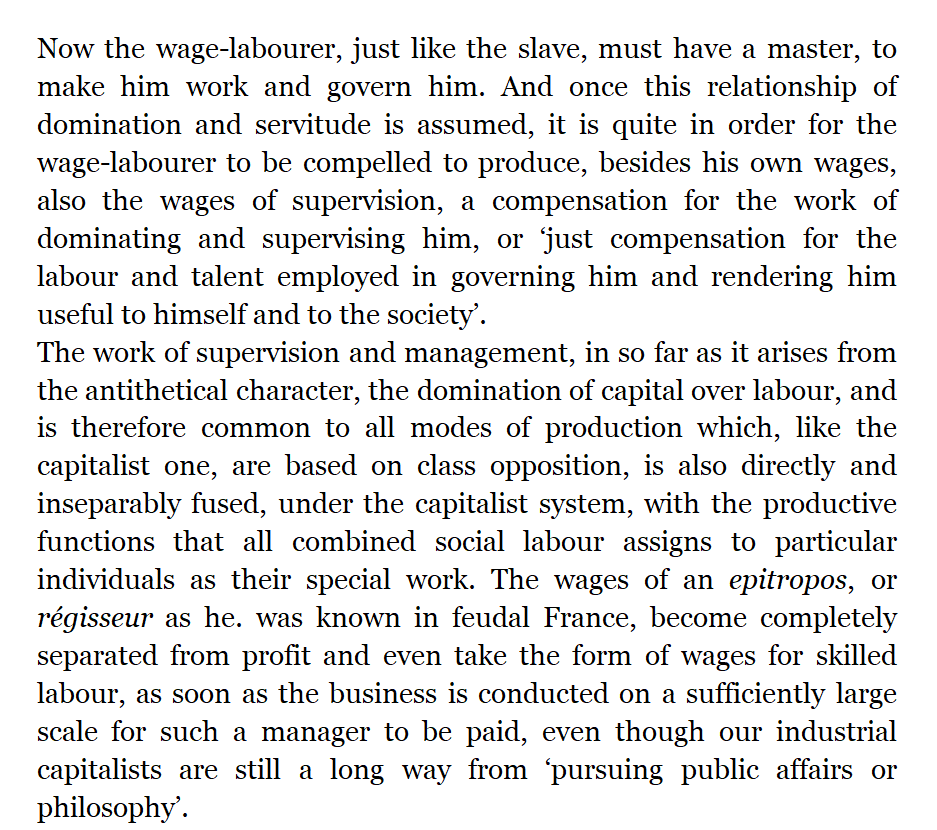in chapter 5 of _Wage Labour and Capital_, Marx asks the question "What is a Negro slave?"and answers with "A man of the black race. The one explanation is worthy of the other." he then states, "A Negro is a Negro. Only under certain conditions does he become a slave."
now, when Marx asks and answers the initial question, he is tongue-in-cheek mocking Proudhon. in other words, he is not actually suggesting that Negro is equivalent to slave. the Negro, as stated directly afterwards, becomes a slave "only under certain conditions."
i bring attention to this because this statement encapsulates the reality that looking to Marx on the question of anti-Blackness necessarily leads to a deadend because when Marx states "a Negro is a Negro," he is invoking ontology here, i.e. metaphysics.
Marx therefore treats the Negro as something truly fixed and immutable so when certain Black radical theorists speak of ontological slavery and Blackness, why the shock and horror? because the latter, to be clear, does not treat the Negro as fixed and immutable.
through failing to understand social death and ontological nonBeing and enslavement, Marx divorcing these two from Blackness or the Negro ironically leads him to fail to escape metaphysics or offer up a meaningful counter to it wrt the Black subject.
hence he is left floundering with the simple statement of "a Negro is a Negro" which can only beg the question of what /is/ the Negro and what /makes/ the Negro. Marx himself therefore leaves us to fill in the blank.
this is a particularly glaring hole wrt Marx because he was, in fact, fully aware of /expressions/ of ontological Slavery such as in Capital Vol III where he quotes an american lawyer who stated "[...]to that condition of bondage the Negro is assigned by Nature."
however because Marx is ultimately making this observation in relation to capitalism & thus the wage-laborer, he describes this as a problem of management and supervision that arises from the relations of production. for Marx, this is nothing more than a tool to justify slavery.
but as a Young Hegelian in the past, Marx should have been aware that it was Hegel and the Hegelian dialectic that delegated Africa to pre-history and characterized it as the "land of children," of "barbarity and wildness", and where "no real history can take place."
the Hegelian dialectic therefore formed a concept of universal history that explicitly and specifically excluded Africa. throughout Marx's critique of Hegel, he neglects to address this, which presents us with an issue of translating Hegelian dialectics to historical materialism.
this is because Marx's evolution of Hegelian dialectics is the transformation of idealism into materialism, or rising from the abstract to the concrete. but what happens when this abstraction is misplaced? that is to say, what if it is a mistake to center abstracted labor?
Marx was correct when he stated that it is only under capitalism that abstracted labor could take hold and precedence, but this does not necessarily justify neglecting the abstract slave. Marx attempts to do so by framing slavery as a tenacious animated corpse.
per Grundrisse, for Marx, wage labor "arises out of the dissolution of slavery and serfdom" and this sheds light on why Marx speaks of the "capitalist nature" of the Trans-Atlantic slave trade and why slavery's importance is delegated primarily to primitive accumulation.
however, delegating slavery to the confines of primitive accumulation is self-defeating because taking into account Marx's understanding of abstract domination, or "consciousness[...] flatter[ing] itself that it is something other than consciousness of existing practice," we find
that the reproduction of capital itself and therefore the political economy begs the question of slavery and the reproduction of political ontology. Marx hedges his bets on the idea of false consciousness and that the abolition of slavery would dispel this false consciousness.
and further, because for Marx, the social relations of capitalism are embodied between the contradiction of wage labor and capital with slavery abstracted out of this relation, "former slaves" would become wage laborers and find common ground with white counterparts.
this did not happen because ontological slavery was both the national consensus and the global consensus. this did not happen because the plantation did not disappear, but rather entrenched itself in new forms.
the enslavement of Africans was not a happenstance that coincided with and drove primitive accumulation. the robbing of slaves' humanity was not merely conditional and for the sake of profit and capital. the proletarian cannot end the abstraction of slavery, only the slave can.

 Read on Twitter
Read on Twitter![this is a particularly glaring hole wrt Marx because he was, in fact, fully aware of /expressions/ of ontological Slavery such as in Capital Vol III where he quotes an american lawyer who stated "[...]to that condition of bondage the Negro is assigned by Nature." this is a particularly glaring hole wrt Marx because he was, in fact, fully aware of /expressions/ of ontological Slavery such as in Capital Vol III where he quotes an american lawyer who stated "[...]to that condition of bondage the Negro is assigned by Nature."](https://pbs.twimg.com/media/EoV_vdSWMAIo5Cf.png)



